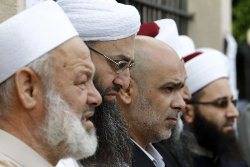Thousands of people flocked to northern Lebanon for the funeral of a cleric who opposed Syrian President Bashar al-Assad, and whose killing triggered clashes in Beirut and raised fears that the Syrian crisis was spilling across the border.
There was a tense calm in Beirut on Monday following overnight clashes between pro- and anti-Syrian Sunni Muslim groups, in which two people died and 18 were wounded, the state-run Lebanese news agency said.
Troops backed by tanks were deployed across the Lebanese capital, especially in areas where clashes pitted two Sunni factions against each other - one that opposes al-Assad and the other that is loyal to a Sunni political figure, Shaker Berjawi, who supports the Syrian president.
The clashes took place in the Beirut neighborhood of Tarek al-Jadidah, raising fears that the 15-month unrest in neighboring Syria was spilling across the border into Lebanon.
Lebanon's commander Major General Ashraf Rifi toured the neighborhood on Monday and told reporters that "things will be getting better."
"There is an uneasy calm.. streets are relatively empty," Al Jazeera's Zeina Khodr reported from Beirut.
"The situation overnight, the clashes that were witnessed in Beirut, were the worst since January 2001 when we saw people take to the streets in protest following the collapse of the government of the former Prime Minister Saad al-Hariri.
"People who took to the streets were supporters of Saad al-Hariri's movement, mainly Sunnis. They were protesting the death and killing of a Sunni cleric and his bodyguard in northern Lebanon."
The street battles came a few hours after cleric Ahmed Abdel Wahed, who backed the uprising against al-Assad, was killed at an army checkpoint in the northern region of Koueikhat.
His killing sparked widespread condemnation and led the sheikh's followers to block major roads in the capital, as well as northern and eastern parts of the country on Sunday.
In the northern area of Beirh, followers of the slain sheikh gathered in a square outside a mosque and took part in the funeral procession while chanting anti-Assad slogans.
"Down with Bashar," chanted the crowd, who also lashed out at Hezbollah leader Sheikh Hassan Nasrallah, a staunch ally of al-Assad.
"We want revenge against Nasrallah and Bashar," shouted the men, who carried the coffin, which was covered by Lebanese and Syrian opposition flags.
As the cleric was laid to rest, scores of his followers fired shots in the air.
Most businesses and schools were closed in northern Lebanon after local officials called for a general strike to protest the killing.
The circumstances surrounding Sunday's shooting of Abdel Wahid remained unclear, but the army said it was investigating the incident.
The shooting took place near the northern port city of Tripoli, where Sunni Muslims last week clashed with Alawite supporters of Assad.
Army officers arrested
Meanwhile, a Lebanese military court Monday ordered the arrest of three army officers and 19 soldiers who were manning the checkpoint where the Muslim Sunni cleric was killed.
The Syrian crisis has divided Lebanon between the Western and Arab-backed opposition and Hezbollah, which dominates the Lebanese government and is allied with Syria and Iran.
The tensions in Lebanon have prompted four Gulf Arab countries to issue security alerts for their citizens against travel to Lebanon.
Kuwait's announcement on Monday was the latest, after Bahrain, the United Arab Emirates and Qatar made similar calls on Saturday.
Beirut-based political commentator Rami Khouri said the recent violence in Tripoli that killed at least eight people and wounded dozens had been linked to events in Syria.
"You have tensions in the area going back years but this has been exacerbated by the situation in Syria ... Syria is not the primary factor, but it is related," he said.
PHOTO CAPTION
Sunni Muslim leader Ahmad al-Assir (2nd L) and other Sheikhs take part in a sit-in in Sidon, southern Lebanon, against the killing on Sunday of Sheikh Ahmed Abdul Wahid, a Sunni Muslim cleric, and Muhammed Hussein Miraib, both members of the Lebanon-based March 14 political alliance, May 21, 2012.
Al-Jazeera


 Home
Home Discover Islam
Discover Islam Quran Recitations
Quran Recitations Lectures
Lectures
 Fatwa
Fatwa Articles
Articles Fiqh
Fiqh E-Books
E-Books Boys & Girls
Boys & Girls  Women
Women










